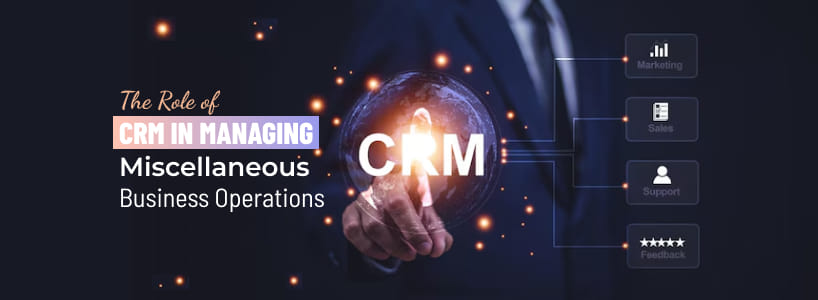The Role of CRM in Managing Miscellaneous Business Operations

In todays highly competitive business environment, managing operations efficiently is key to staying ahead. While most companies rely on CRM (Customer Relationship Management) systems to streamline sales and customer service, their benefits go far beyond that. Modern CRMs are versatile tools that play a pivotal role in managing miscellaneous business operations, offering centralized control, improved productivity, and better decision-making.
Beyond Sales: CRM as an Operational Hub
CRM platforms have evolved from mere contact management tools into robust ecosystems that support a wide array of business functions. From automating administrative tasks to monitoring employee performance, CRMs now serve as a central hub for various operations. For instance, businesses can integrate project management, vendor communication, task scheduling, and even internal training workflows into their CRM systems. This allows for better coordination across departments and a unified view of business activities.
Streamlining Internal Communication
One often-overlooked aspect of business operations is internal communication. CRMs facilitate seamless collaboration between teams by offering shared dashboards, communication logs, and real-time updates. This not only enhances productivity but also reduces the risk of errors and duplication. Especially in businesses with remote or hybrid work models, CRM tools help maintain transparency and accountability across teams.
Data-Driven Decision Making
Another major advantage of using CRM for operational tasks is the access to real-time analytics and reporting. These insights empower managers to make informed decisions based on data rather than guesswork. Whether it's identifying bottlenecks in the workflow, monitoring customer satisfaction trends, or evaluating employee performance, CRM dashboards offer actionable intelligence at a glance.
Integration with Other Business Tools
Modern CRM systems can be integrated with other software such as ERP platforms, accounting tools, and HR management systems. This integration enables businesses to manage all facets of their operations from a single platform. For example, syncing your CRM with your invoicing tool allows for automatic billing and payment trackingreducing manual workload and human error.
The Importance of Choosing the Right CRM Software
Not all CRMs offer the same functionalities. Choosing the best CRM software for small business ensures that even limited-resource operations can benefit from automation, efficiency, and scalability. Businesses should evaluate their specific needswhether its customer retention, internal task management, or vendor relationship trackingand select a CRM accordingly.
Enhancing Customer Experience
While CRMs core functionality revolves around customer management, its operational capabilities indirectly enhance the overall customer experience. Efficient internal processes lead to faster service delivery, consistent communication, and personalized interactionsall of which contribute to higher customer satisfaction and loyalty.
Conclusion
CRM systems are no longer confined to sales departments. Their role in managing miscellaneous business operations is becoming increasingly vital. From boosting internal efficiency to enhancing customer relationships, CRMs offer a scalable solution for businesses aiming to thrive in a dynamic market. Investing in a robust CRM system is not just a tech upgradeit's a strategic move toward sustainable growth.
Add a Comment
Your email address will not be published. Required fields are marked *
Categories
Popular Posts
![Customer, Lead, or Deal? Understanding CRM Sections for Smarter Sales [thumb]](https://blogimages.weblink.in/customer-lead-or-deal-understanding-crm-sections-for-smarter-sales-350x128.jpg)
Customer, Lead, or Deal? Understanding CRM Sections for Smarter Sales
![How EduAutomate Brings Real-Time Visibility to All Admin Operations? [thumb]](https://blogimages.weblink.in/how-eduautomate-brings-real-time-visibility-to-all-admin-operations-350x128.jpg)
How EduAutomate Brings Real-Time Visibility to All Admin Operations?
![How CRM Vendor Management Enhances Your Procurement Process [thumb]](https://blogimages.weblink.in/how-crm-vendor-management-enhances-your-procurement-process-350x128.jpg)